
by Dharam CW2 | Mar 21, 2024 | Professional Development Webinars
Dive deep into the PMI’s latest enhancements to the Program Management Professional (PgMP)® credentials, tailored for senior project, program, and portfolio management professionals.
Registration Link: https://bit.ly/4c9un0j
Session Date : 26th March 2024
Session Time : 10:30 AM – 11:30 AM (PDT) / 11:30 AM – 12:30 PM (MDT) / 12:30 PM – 01:30 PM (CDT) / 01:30 PM – 02:30 PM (EDT) / 02:30 PM – 03:30 PM (BRT) / 05:30 PM – 06:30 PM (GMT) / 06:30 PM – 07:30 PM (CET) / 07:30 PM – 08:30 PM (SAST) / 08:30 PM – 09:30 PM (AST) / 09:30 PM – 10:30 PM (GST)
Webinar Agenda
– Simplified Application Insights: Grasp the updated application’s simplicity, from reduced experience summaries to a wider panel expediting reviews.
– Revised Standard for Program Management: Unpack the 5th Edition’s eight principles, spotlighting Stakeholders and Governance to elevate global program practices.
– Aligned Exam Content: Decode the subtle yet vital changes in the exam outline mirroring the new standard’s language.
– Exclusive PMI Membership Perks: Uncover the benefits, including complimentary access to crucial PMI standards, bolstering your certification pursuits.
– Industry Expertise & Dialogue: During our expert insights, benefit from the wisdom of a seasoned PgMP trainer. Clarify your doubts in our extensive Q&A segment.
– Preparation Roadmap: Walk away confidently with a strategic action plan, essential resources, and community backing to conquer the new PgMP exam.
🚀 Elevate Your Project Management Career:
– Book an obligation-free consultation session on Project management Career, training, and certifications: http://talktodharam.com
– Discover training offers and certification discounts: https://bit.ly/3jWVepD
– Stay updated with our Q&A series and certification success stories by subscribing to the vCare Project Management YouTube channel at https://bit.ly/2YF0wJl
– Follow my podcasts and interviews with Project Management Experts on YouTube at https://bit.ly/2NDY8wd
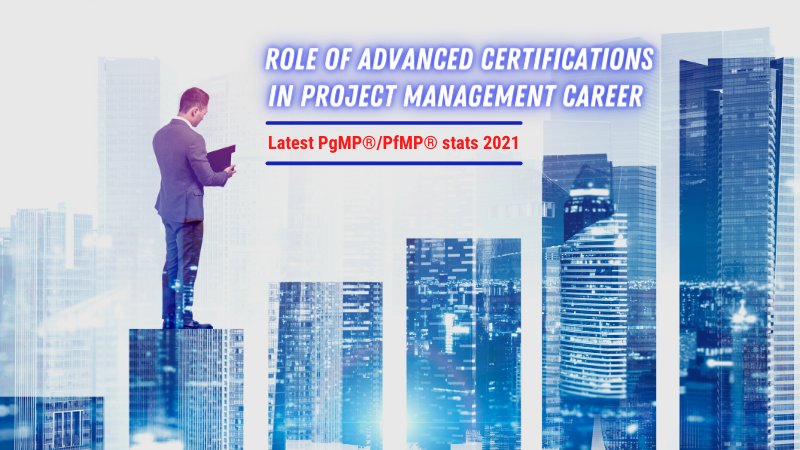
by DharamCW | Mar 19, 2021 | How many PgMP | How many PfMP
Most project management professionals with a certain number of years of experience would like to move up their career ladder to senior positions that provide them with higher visibility, wider recognition, and a definite bump in their pay scale. They would aim to become a
- PMO Leader of their organization
- A Program Manager handling multiple connected projects
- A Portfolio Manager who drives the vision and mission of an organization through successful programs and projects
- An executive who is implementing a strategic initiative for the success of the organization
Some professionals might be looking to migrate from their current organization to a better/higher position in another organization and might be wondering what could be one of the keys that open that door to success.
Advanced Certifications might be the solution.
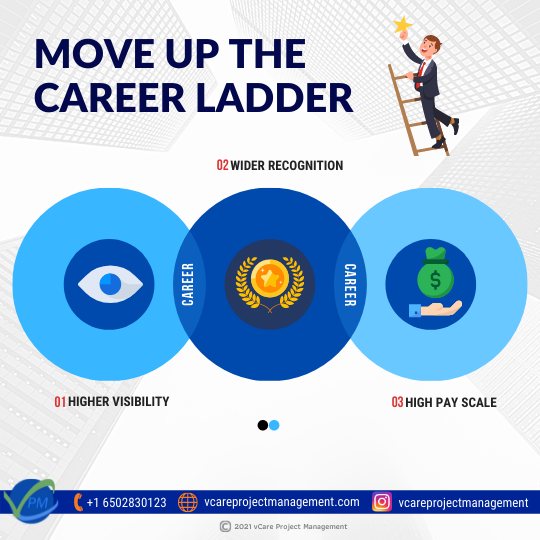
Move up the career ladder
Advanced Certifications
Advanced Certifications are for professionals,
- Who are established in their careers but want to climb up further
- Who want to increase their knowledge and improve professional ways of working
- Who are working in a role much more extensive than their current designation
- Who wants to prove a point to professionals in their space about their capabilities
- Who wants to prove a point to themselves for self-motivation and increase their self-worth
Advanced Certifications help you to,
- Change labels from being named an Experienced/Advanced professional to become an Expert/Master of the art.
- Change levels to elevate yourself to higher levels in the organizational hierarchy. Earn the birds-eye view.
- From “Doing the work right”, move to a phase where you start “Doing the right work” to ensure your organization’s mission and vision are accomplished through your actions. Go from Tactical to Strategic.
- It opens doors that were earlier closed in your career and creates new doors for you to venture. Gain global recognition. SKIP THE QUEUE IN PROFESSIONAL EVALUATIONS.
- Stand out from the crowd, Be that Differentiator.When all is Equal, the certified gets hired.
- Eliminate career shocks such as layoffs and retrenchments.
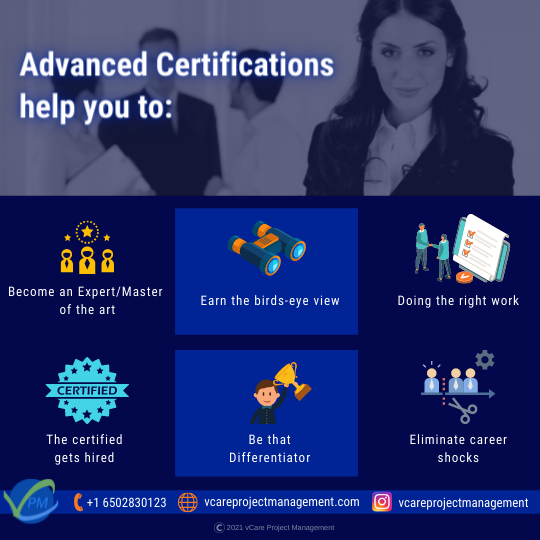
Advanced Certifications
Why PgMP® & PfMP®?
The PgMP® certification recognizes advanced experience, skill, and performance in overseeing multiple related projects and their resources aligned with an organizational objective. PgMP® certification holders oversee a program’s success — a way to group multiple related projects to achieve benefits that may not be realized if the projects were managed in a stand-alone fashion.
The PfMP® certification recognizes advanced experience, skill, and performance necessary to manage and align a portfolio of projects and programs to realize organizational strategy and objectives. PfMP® certification holders oversee one or more portfolios’ success, balance conflicting demands between programs and projects, and allocate resources based on corporate priorities and capacity. As portfolio management continues to grow and organizations adopt it to achieve strategic objectives, it becomes more critical to have individuals competent in this practice area. As employers demand portfolio managers who can support the organization’s strategic goals, PfMP® certification holders will gain a distinct advantage in employment and promotional opportunities over their peers.
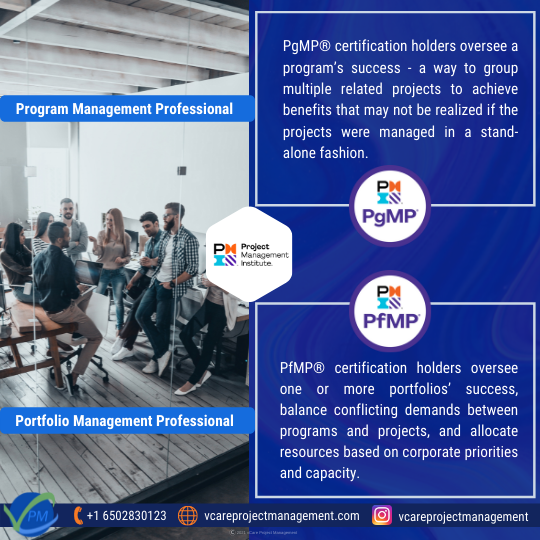
Why PgMP® & PfMP®
Both PgMP® & PfMP® from PMI could help you achieve the possible elevation within your organization or get you the golden ticket to join your targeted organization. Compared with the PMP, which is more than a million globally, the numbers for PgMP® and PfMP® are still in the four digits, with PfMP® crossing the 4-digit mark just a few months ago.
The Numbers – What do they say?
Irrespective of the Pandemic concerns, professionals have been pursuing their PgMP® & PfMP® goals aided by the online/remote learning program options. PgMP® has crossed the 3500 number barrier, and as on 1st March 2021, it is now at 3543. PfMP® has crossed the 1000 number milestone, and as on 1st March 2021, it is now at 1035.
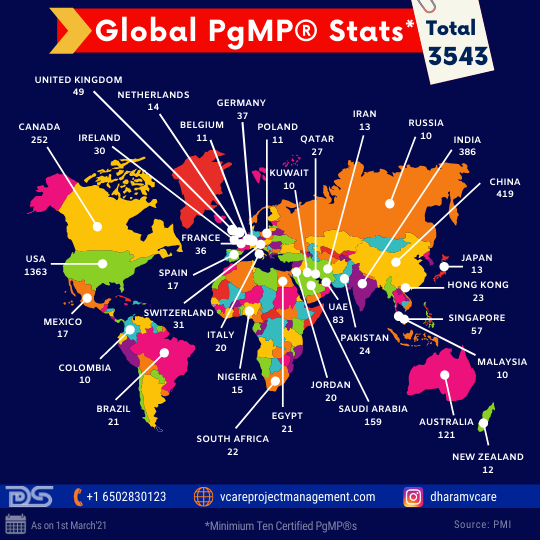
Global PgMP® Stats 2021
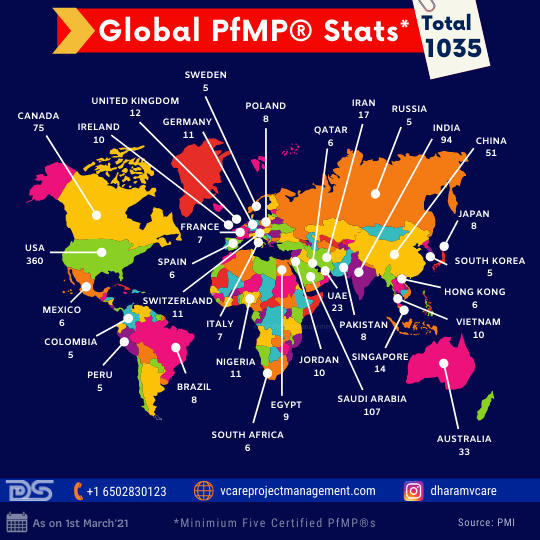
Global PfMP® Stats 2021
USA, China, India, Canada, and KSA contribute to the top 5 numbers in PgMP® and PfMP® numbers.
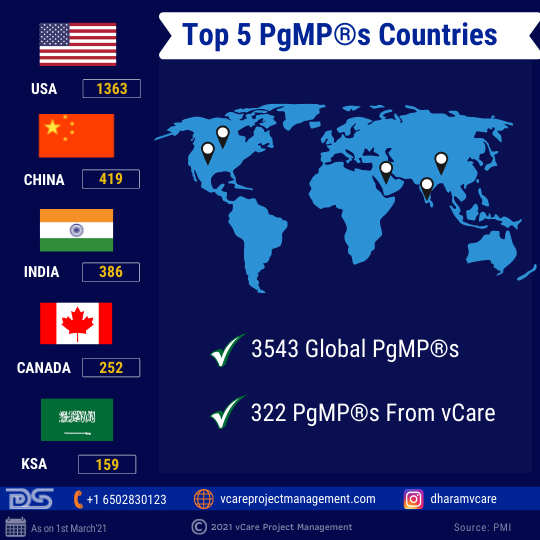
Top 5 PgMP® Countries
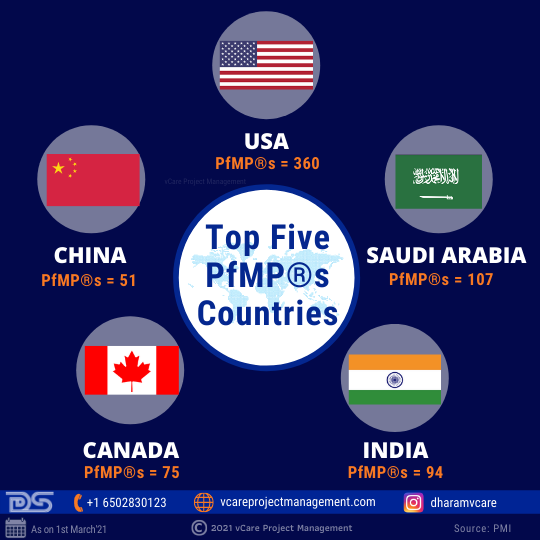
Top Five PfMP® Countries
A unique aspect in PfMP® numbers is the surge of certification holders from KSA, which has overtaken India to become the second country with the maximum number of PfMP® holders after the USA. With our training partnership with the PMI-KSA chapter, I wish the numbers of not only PfMP® but also that of PgMP® surge ahead. Students from KSA and the PMI-KSA chapter can reach out to me to avail offer associated with our partnership.
vCare Project Management is proud to have supported the following students in February 2021 in their successful pursuit of certification. This 2021, we have been producing excellent results with 10 PgMP®s and 6 PfMP®s achieving success in their certification goals aided by our training services thus far.
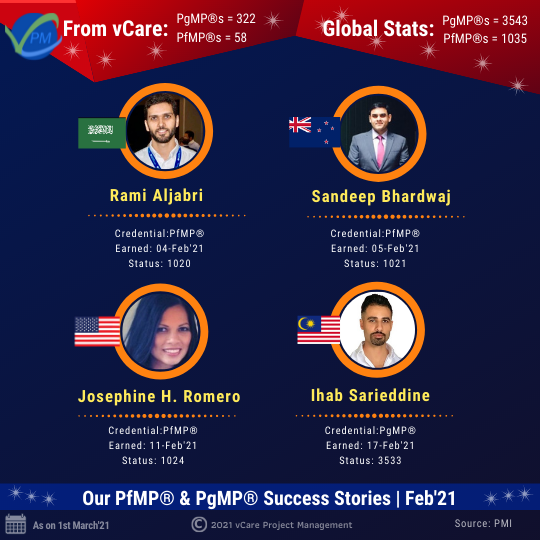
PfMP® & PgMP®s Success Stories | Feb’21
In the year 2020, we supported 48 PgMP®s and 16 PfMP®s in achieving success. As on 1st March 2021, we have thus far aided 322 PgMP®s of the 3543 PgMP® professionals and 58 PfMP®s of the 1035 PfMP® professionals. We have supported 322 students across 44 countries in their successful PgMP® journey.
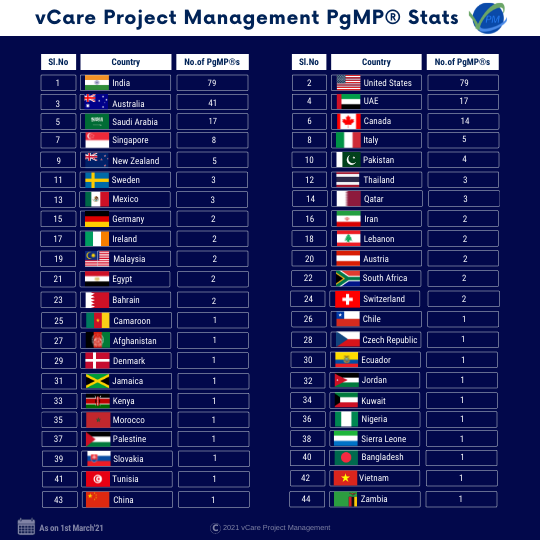
vCare Project Management PgMP® Stats
Because of the hardships that the companies and professionals are going through currently, I have decided to offer multiple discounts and flexible payment options to our upcoming mentoring and boot camp programs in 2021. These include,
- A 20% discount for Active Duty or Veteran professionals from Army, Marines, Navy, Air Force, Border, and Coast guards or any other valid military service branch
- A 20% discount for Women professionals
- A 20% discount for Differently abled professionals
- A 20% discount for professionals who are currently in dire financial constraints
Please email ([email protected]) or reach out to me on LinkedIn to avail of this discount post appropriate scrutiny.
Given below are the various online programs’ links. The online mentoring programs / virtual boot camps cover all time zones.
PgMP®: http://bit.ly/2oBKQXQ
PfMP®: http://bit.ly/39jOZSf
SAFe® / Disciplined Agile: http://bit.ly/3ogQY0N
PMP®: https://bit.ly/2BU0mFp
E-Learning: http://bit.ly/3b2HOid
Subscribe to vCare Project Management YouTube Channel to view our success stories: https://bit.ly/2YF0wJl
We are planning to do more webinars in the coming weeks. Subscribe and follow my Podcasts and interviews with Project Management Experts on YouTube at https://bit.ly/2NDY8wd
Aspirants aiming to get the PgMP® / PfMP® / SAFe® / PMP® / Disciplined Agile Credentials in 2021 can book an obligation free session with me to find out how I can assist you in passing the exam in your very first attempt. For any questions related to Project Management career, training, and certifications, you can book an obligation free 15 minutes session with me by visiting talktodharam.com
PgMP4U LinkedIn Group: http://bit.ly/2SBPwIp
PfMP4U LinkedIn Group: http://bit.ly/31P7GKR
Conclusion
Going by the numbers and the process involved in gaining the PgMP® / PfMP® certifications, it isn’t that easy for everyone to climb this mountain. These certifications are elusive by nature, and only with a determined focus, dedication, and brilliance coupled with hard work can one be able to achieve success.
I believe that this makes these certifications elite when compared with other senior project management certification offerings. This aspect alone could be the differentiator that highlights you from your peers in the project management community, helping you achieve your objectives.
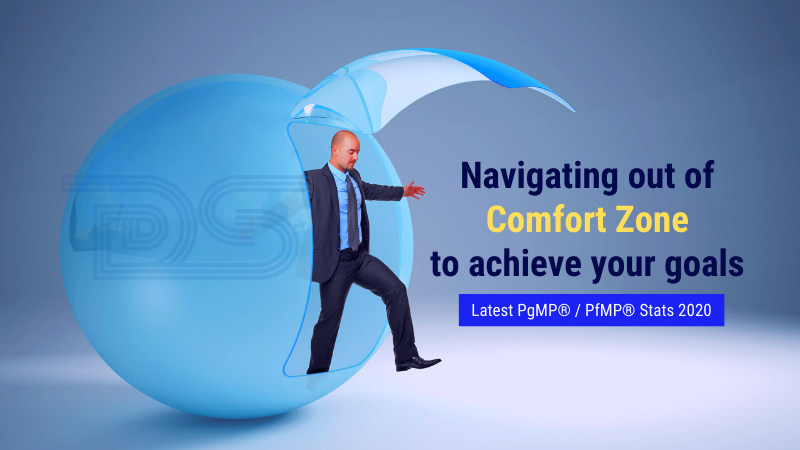
by DharamCW | Sep 19, 2020 | General
The term “Comfort Zone” has been put to use in professional citations since the 1991 work “Danger in the comfort zone”. It became widely popular after the paper “From Comfort Zone to Performance Management” by Alasdair White in 2008. “Comfort zone” is to be understood as a behavioral state from which an individual operates or works or carries on his way of life. Comfort zone is almost unique to everyone, and it may or may not be equivalent to another individual.
In our life, we do come out of our comfort zones many times, though we rarely recognize it. Your first day at school, moving from school to college, college to your first job, making your next big career move, etc. could be stated as examples.
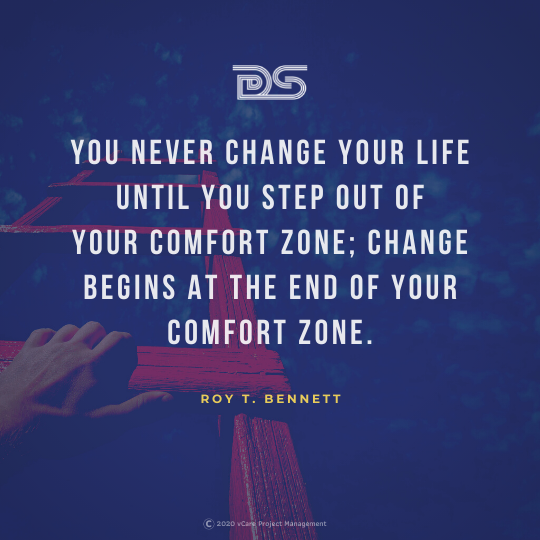
Comfort Zone
At these points in time, we would have experienced a lot of pressure to adapt, expand our skills and continue to learn and evolve. Our inner ego would have pushed us to get out of being labelled as incompetent, inauthentic or an imposter and succeed in the new role assigned to us by time.
It’s also critical to understand first the opportunities this journey out of your comfort zone would reward you. Here we discuss some ways using which we can navigate ourselves out of our comfort zones to achieve success.
Indicators of you being in a comfort zone
Let’s take a case where you have been working as a manager in a reputed organization, handling specific operations, and you are awesome at what you do. If you have specific career goals, and you have identified your destination, you need to understand whether you are currently in a comfort zone first.
Some indicators could be,
- You are doing your job with ease and make consistent paychecks
- You don’t have anybody to benchmark within the organization or the industry forum
- You are pretty much self-sustained, and you don’t see yourself any scope for further growth
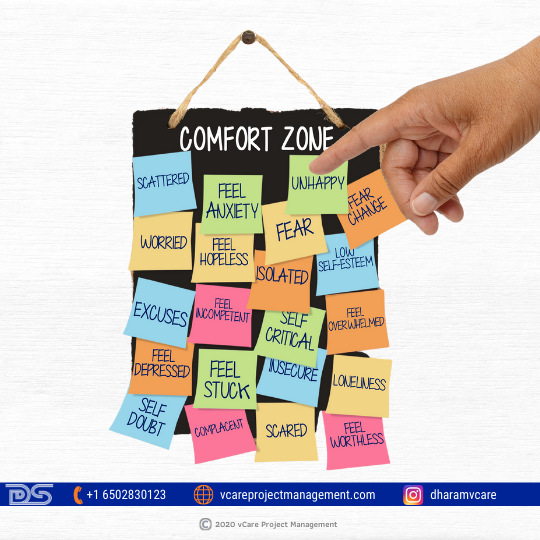
Being in a comfort zone
Comfort zone Assessment Questions
Here are some questions which can help you understand if you are already in the comfort zone.
- When was the last time you were very stressed in making some decisions at work?
- When did you last take up a new challenge?
- When did you do something creative and new?
- Are you happy with what you are doing?
- Are you sure that you are not lost nor out of control?
Why do we need to move out of the Comfort Zone?
When we are in the comfort zone, we don’t learn; we don’t evolve. Learning gets halted, and we fail to embrace new ideas and concepts. We stop experiencing newer things in life, and this might result in loss of acquiring critical behavior or skills. We naturally become the victim of behavior patterns which we are used to as the time spent on comfort zone becomes longer.
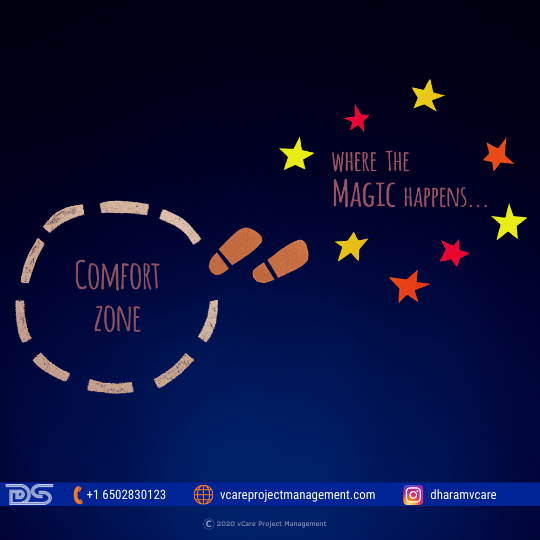
Why do we need to move out of the Comfort Zone?
Gone are the days where living in such a context is not a life challenging issue for an individual. Times have changed, and in today’s professional world, only those who embrace continuous learning and adaptability are better poised to succeed.
Understanding the Fear zone
For any individual contributor of a team, the moment you feel that you have the capability coupled with an excellent opportunity to be part of leadership or management, your journey out of your comfort zone has begun.
When you think about doing something new, you naturally get fear, or you feel terrified. When this thing happens, most of us cloak ourselves with any of these following excuses:
- Yeah, I’m doing what I know very well, and there is nothing wrong about it.
- Why do we need to change the status when everything is going fine today?
- Having a false impression that you have future proof skills because you are thriving today.
- I have maneuvered myself this far, why do I need to propel my limits further.
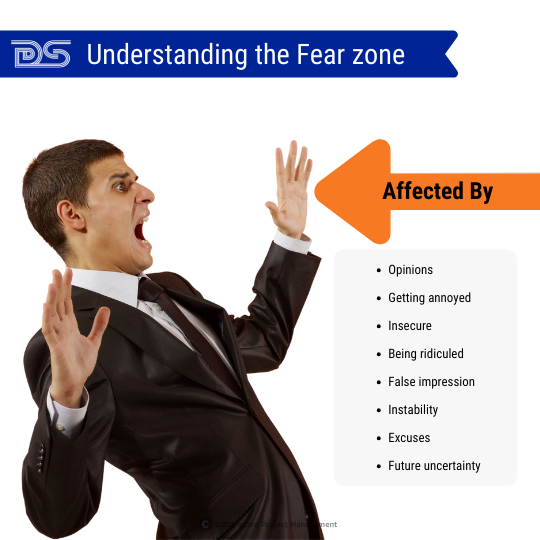
Understanding the Fear zone
When we are in the fear zone, we also tend to be affected by other opinions and get annoyed. Typically, in projects, some people can be identified in a peculiar way wherein they will not share any information due to insecurity or fear. They always worry about what is going to happen.
These are individuals who build a shell around themselves thinking what will others think If I ask this question, maybe people will laugh at me, ridicule me, etc. These are good signs indicating you are in the fear zone.
What is needed to come out of the fear zone?
- Courage
- Compassion
- Wisdom
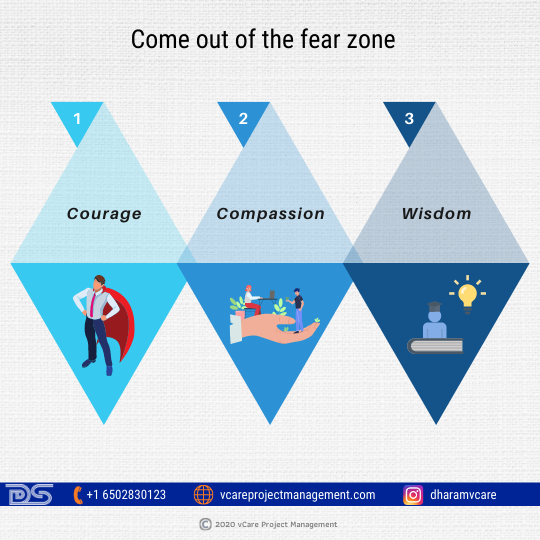
Come out of the fear zone
Have the courage to understand and look situation like “You are not alone” in this. Look at the situations more positively. Consume information which is more reliable and that which will lead you the right direction. Trust yourself first, and also others around you. Get around with people who are your well-wishers and find them within the project organization. Discuss your fears openly with them take baby steps to come out of it. Believe that when you confront your fears, you will also be able to help others confront the fear and manage it better for the overall good of the organization. It might take longer than you think to come out of it, but it is alright. You will be able to maneuver out of the fear zone and move towards reaching your full potential by getting transformed at the Learning Zone.
Most individuals tend to get stuck in this zone or go back to their comfort zone. You must stay in the course of advancing into the subsequent zone. The journey is more rewarding than the end goal of getting beyond the growth zone. Now let’s look at the learning zone.
Learning Zone: Knowing vs Doing Gap
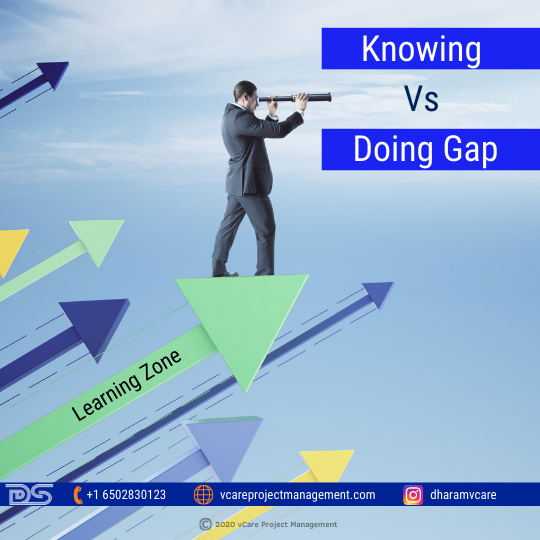
Learning Zone
You are managing a project in India; you have a multi-cultural and a multi-lingual environment. Such a context could position you to get out of the comfort zone to interact, manage these stakeholders.
You, an expert in process manufacturing, is assigned to work on a new project where you are dealing with discrete manufacturing. Here you will have the pressure of handling something new which you haven’t done before.
Given these kinds of situations, project managers tend to look at various resources in terms of books, YouTube videos, courses and prepare themselves. Yet, they will have the anxiety as there is a Knowing-Doing gap. In this case, the learning ought to get transformed as behavior.
Dr Andy Molinsky is a professor at Brandeis University’s International Business School and author of “Reach: A New Strategy to Help You Step Outside Your Comfort Zone, Rise to the Challenge and Build Confidence” recommends 3Cs for the same they are:
- Conviction
- Customization
- Clarity
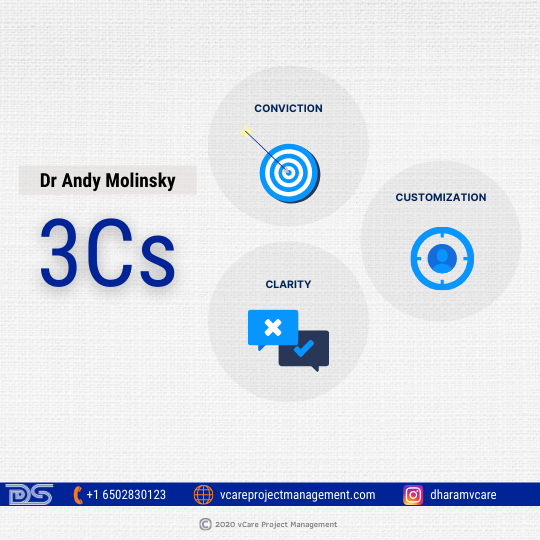
3Cs
Conviction is more towards understanding the deep sense of purpose which can come from the activities which can help your self-esteem or when you have the intent of helping or enabling others. For example, you have a challenge in your project to work on a Gantt Chart, which is essential to be presented to the management. You find that no one else in the team knows about it. Now you need to have the conviction to build it yourself first time as you want to enable the team to help them understand the project situation better. That intent helps you to get you the transformation required. This way, you have responded to the challenge, and also acquired a new skill in the process.
Customization is more of tweaking the solution in your way. Every project organization or PMOs could be different. What worked in your previous office might not work here, as people have cultural and behavior differences. You must customize the data, context, terminology, presentation to their needs by taking steps completely new compared to what you have done in the past. Being adaptive is the most beautiful thing people always admire.
Clarity serves the situation where it is very distorted and chaos. Especially in Project/Program/Portfolio management, where pressing priorities of activities create a nightmare for the managers and resources become contentious. Step away for a short while to take stock of the situation, put yourselves in other person shoes, Self-reflect upon the situation in the right context. Many times, reaching out to a coach or mentor would help in the situation.
Keep building your resilience by doing good things which you are not comfortable. Some simple examples could be Saying “Hello” to strangers, ordering food other than your routine. These acts could increase your will power and mental attitude. By doing these, you can make learning zone your comfort zone and start advancing into the growth zone. Consistently focusing on moving out of the comfort zone is the key.
Growth Zone
Instead of thinking “What if I’m not good enough?”, thinking more like “What if I’m good enough and moving towards success?” would help to be in the growth zone.
Instead of worrying and being stranded at the learning zone, identify the gap in terms of training, upskilling needs, mentoring, coaching needs that navigate towards your objectives. For example, if you are lacking in risk management or project management and need guidance, reach out to the right consultants or coaches or mentors who can help you succeed.
Eradicate the habitual negative thinking and internal fears. With the help of knowledge that you acquired in your learning zone; you should be able to manage things in the growth zone easily. Always ask “What’s the best, most productive action I can take to get the best possible outcome given the situation?”. Change your environment to be positive, have positivity anchors and use visualization techniques. By changing the internal representation of the problem, your ability to recover from that is increased manifold. As a project manager, there are a lot of dependencies and constraints you ought to manage; these dependencies and constraints need to be overcome to eliminate the fear of failure.
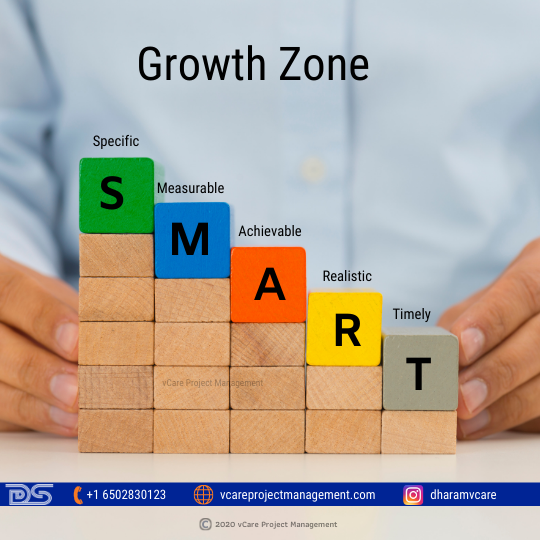
Growth Zone
Typically, negative experiences are what creates fear within. If you believe and value whatever you are doing, you will find a way. You will begin to see them as challenges as opposed to problems or obstacles. Make your goals SMART and start recording your smaller achievements in a book which you can use to track and repeatedly revisit to gain motivation. By eliminating needless fears and factors that hamper your progress, you can break out and live a life beyond limits!
PgMP® / PfMP® certifications
For most senior professionals in the project-program-portfolio management community, there has been no bigger phobia than the PgMP® / PfMP® certification exams. Over the past few years, an aura of unconquerability has been associated surrounding these certifications, but nothing can be far from the actual truth. With proper guidance supported by a well laid out action plan, followed by commitment and hard work, these certifications are achievable, and many of my students are witnesses to the fact. Let us look at the recent stats, concerning these two certifications to understand how exactly this community has managed to thrive irrespective of the current context.
Between 1st July 2020 and 1st Sept 2020, 60 professionals successfully attained their PgMP®, of which 12 are my students. Congratulations to all 60 of them for continuing to have the inner drive to succeed in these tough times.
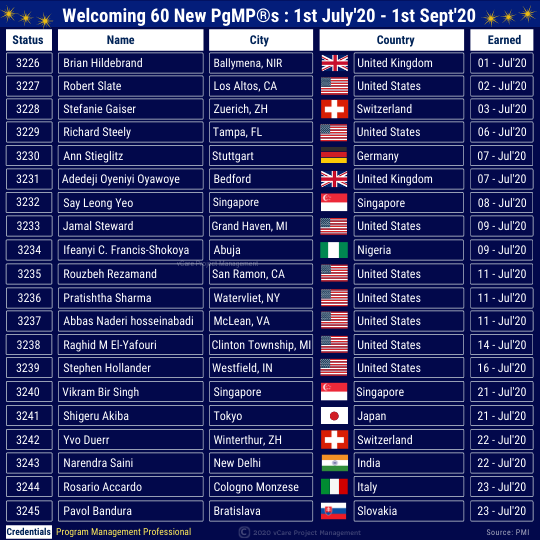
Welcoming 60 New PgMP®s
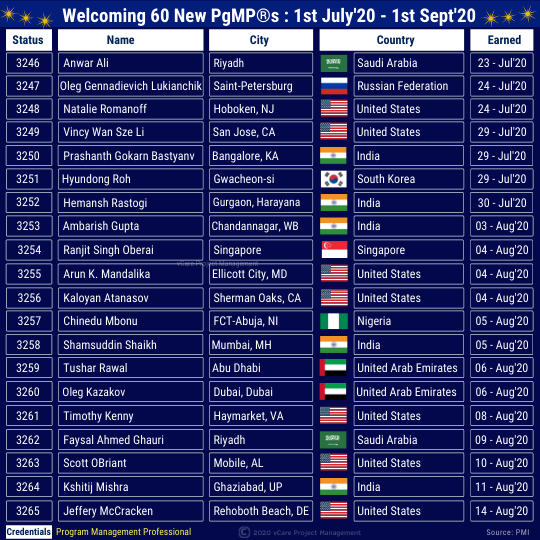
Welcoming 60 New PgMP®s
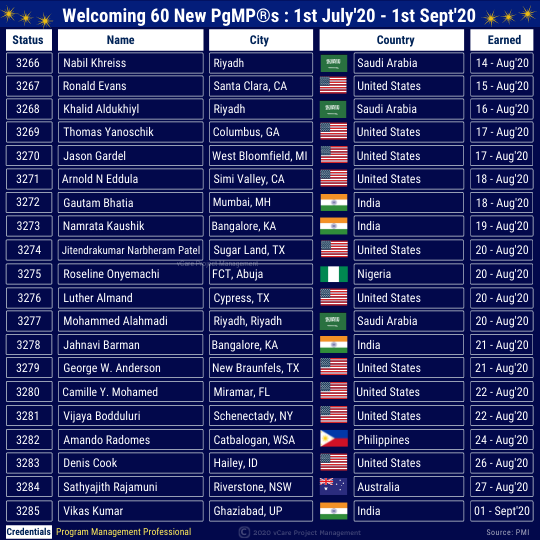
Welcoming 60 New PgMP®s
Regarding PgMP®, as on 1st Sept 2020, vCare has contributed to the success of 289 global PgMP®s (out of 3,286) from 43 countries.
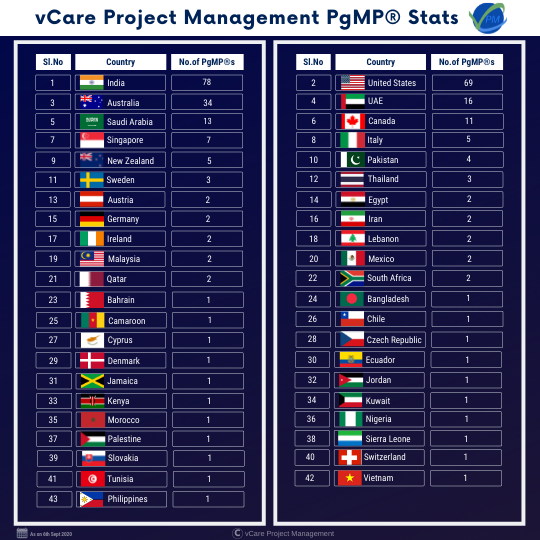
vCare Project Management PgMP® Stats
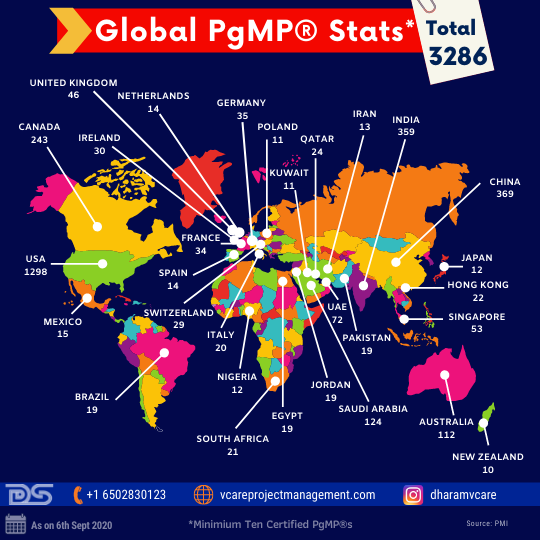
Global PgMP® Stats
Between 1st July 2020 and 1st Sept 2020, 27 professionals successfully attained their PfMP®, of which 2 are my students.
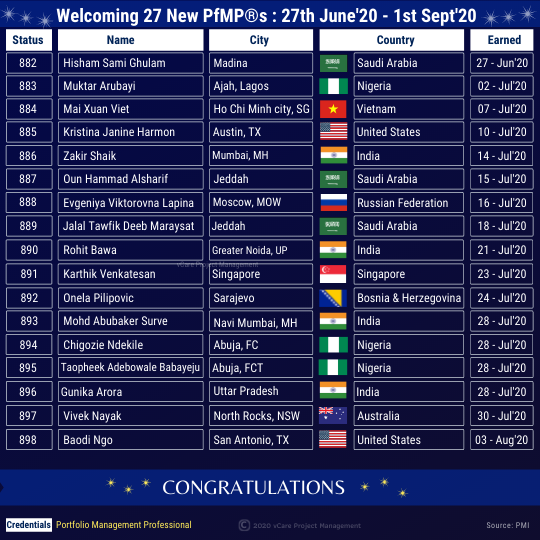
Welcoming 27 New PfMP®s
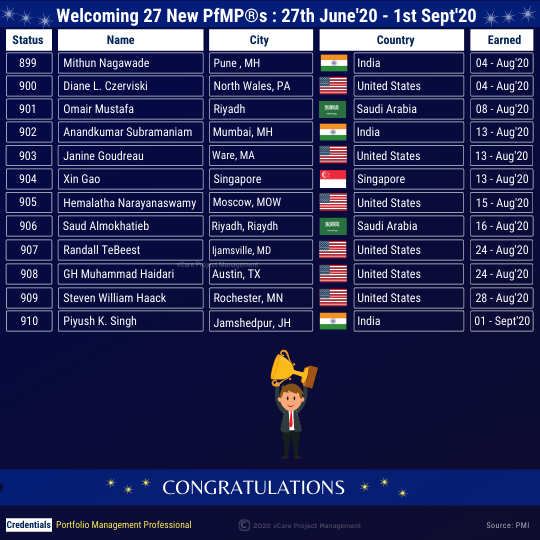
Welcoming 27 New PfMP®s
As on 1st Sept 2020, Global PfMP® count is 911, with 41 of them (5%) with a successful pass rate of 100% being aided by our services.
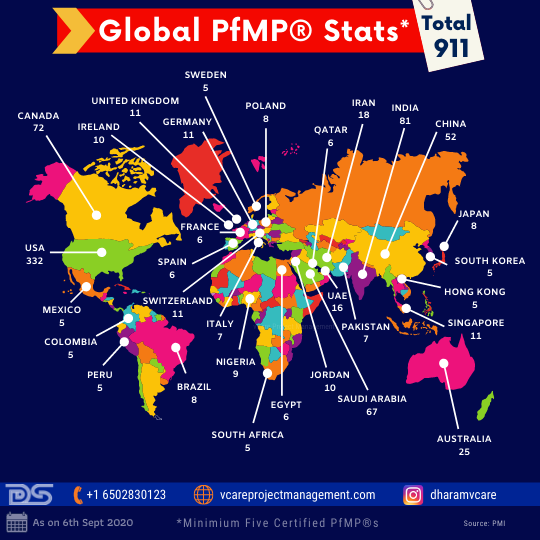
Global PfMP® Stats
Special thanks to the 14 students for entrusting me with their PgMP® / PfMP® certification journey.
1. Vikas Kumar 2. Gautam Bhatia 3. Jason Gardel 4. Faysal Ghauri
5. Tushar Rawal 6. Oleg Kazalov 7. Kalo Atanasov 8. Ranjit Oberai
9. Ambarish Gupta 10. Hemansh Rastogi 11. Vincy Li 12. Natalie Romanoff
13. Omair Mustafa 14. Hisham Sami Ghulam
Even as this pandemic crisis is still rolling out and impacting our economy and jobs, many professionals have elected to emerge out of their comfort zones and work towards pursuing their learning/certification goals. For us, as a leading training provider, the challenge was to customize and optimize our training delivery to meet the online learning requirements that time has thrust on us. What we saw as a challenge and a difficult mountain to climb initially, later turned out to be a smooth journey filled with more advantageous in terms of course delivery, benefiting both the trainers and students on many fronts. Whoever is taking advantage of this lean period to lunge forward are already starting to see benefits with their professional life.
My opinion is that 95% of people stay in their comfort zone. Around 3% people take steps to walk in the fear zone and stay there or come back to comfort zone. 1.5% people stay in the learning zone, and some of them come back to Fear Zone or even Comfort Zone. 0.49% people reach to the Growth Zone, some come back to the lower zones. Less than 0.01% of people go above or stretch beyond the Growth Zone and do wonders. They never return to the lower zone as they move with the escape velocity. Do come out of your comfort zone; the sky is your limit. For those already in the sky, space is your limit. Trust me; you will live a life beyond your dreams. Between, no one is born with skills and attitude, which will take you all the way. More you look inside it will assist you to look beyond the invisible boundaries.
For those of you in the project management space, who wish to get help in navigating out of your comfort zone and achieve PgMP® / PfMP® certifications, consider signing up for our online programs. We will guide you through all the facets of the PgMP® / PfMP® certification journey. Taking into consideration the hardships that companies and professionals are going through currently, we are offering multiple discounts and flexible payment options to these programs. These programs are conducted over customized timings across different time zones to cater to the requests of the students. Given below are the various online programs’ links. Kindly share this information with anyone who you believe might benefit from it.
PgMP®: http://bit.ly/2oBKQXQ
PfMP®: http://bit.ly/39jOZSf
PMP®: https://bit.ly/2BU0mFp
E-Learning: http://bit.ly/3b2HOid
For any questions related to Project Management career, training and certifications, you can book an obligation free 15 minutes session with me by visiting talktodharam.com
PgMP4U is an online mobile application that helps one prepare for the PgMP® exam on the go. Our app gives the essential support required for cracking the PgMP® exam.
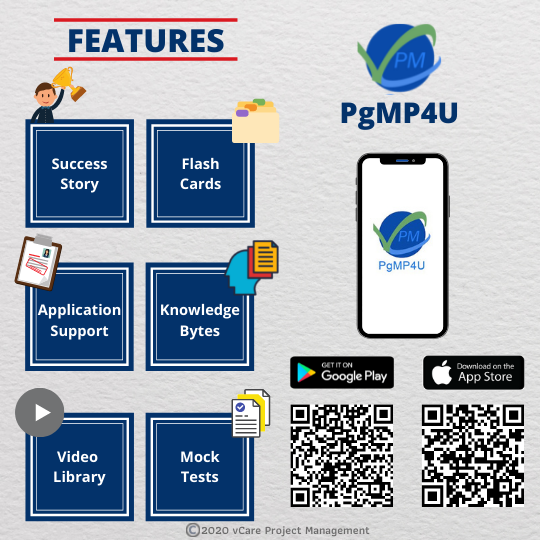
PgMP4U
PgMP4U LinkedIn Group: http://bit.ly/2SBPwIp
PfMP4U LinkedIn Group: http://bit.ly/31P7GKR
Subscribe to vCare Project Management YouTube Channel to view our PgMP® and PfMP® Success Stories: https://bit.ly/2YF0wJl
Subscribe and follow my Podcasts and interviews with Project Management Experts on YouTube at https://bit.ly/2NDY8wd
“Working together for success.”

by DharamCW | Jun 26, 2020 | General
The impact of Covid-19
The key to surviving a global crisis is to display resilience by adapting to the ever-changing circumstances and giving up current practices in favour of those that are more tailor-made for the situation at hand. Given that Covid-19 has led to an unpredictable stagnation of growth, we are now faced with what is known in project management terms as the “unknown unknown”, which are risks that come from completely unexpected situations. We are witnessing this in the form of a disease outbreak that has upset all of our lives.

Resilience of Project Management Professionals
Entire business pyramid collapses have left organizations with the question of whether or not to change their entire mode of operations. Naturally, the answer is to adopt any means necessary to ensure that they continue to generate value for their beneficiaries. With a PgMP® certification, program managers can add value to their organizations and truly make a meaningful difference in this aspect. There will always be a demand for qualified professionals in the market. A PgMP® certification allows its holders to stand apart from their peers.
PMP® and PgMP® certification – What is the difference?
PMP®: It is purely knowledge-based and theoretical, relying on test-taking to quantify a candidate’s ability in recollecting facts and data. There are over a million holders of this certification globally.
PgMP®: It is competency-based, and it requires the candidate to become acquainted with theoretical concepts and demonstrate their applications in a practical setting, akin to the real world. The candidate is subjected to a peer review where he must explain the thought process that led to his decision. Such rigorous scrutiny has kept the bar high and has helped produce some of the most competent program managers that the world has ever seen. There are only around 3100 holders of this certification.
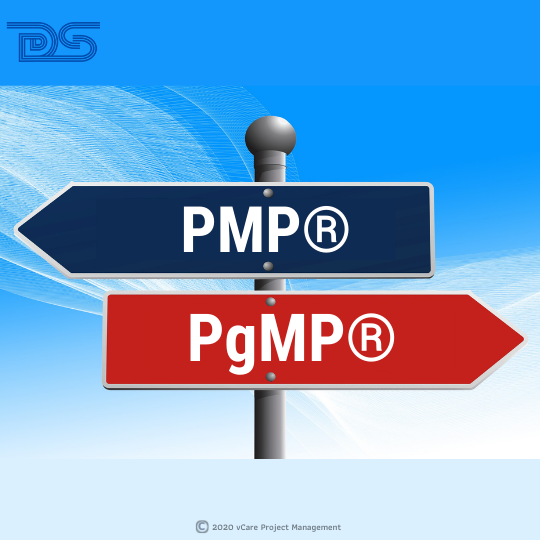
PMP® | PgMP®
In this environment of job insecurity and mass layoffs, such certifications are the most worthy qualifications that a professional can possess, to project his skill set and capabilities.
Value management: The generation of value is at the core of any organization. It may take on the form of project, program and portfolio management. Still, it is ultimately based on a single, underlying framework that binds them together, which is termed as “value management”. When program managers realize and embody this simple principle, an increase in revenue, market share and share value is bound to follow.
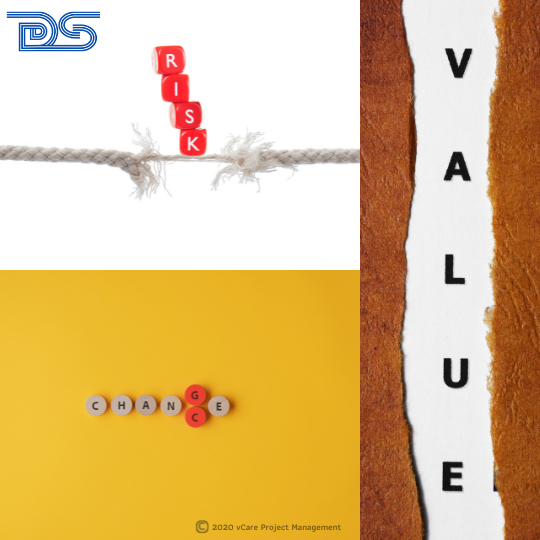
Value | Change | Risk
Change management is the ability of a manager to respond to disruptions, and it is the key to survival. But even when things change, some things will hold true at all times; one of which is the importance of the bond between organizations and their stakeholders. In times of adversity, program managers must display resilience and instil confidence in not just their organizations or their clients, but also their community at large.
Risk management: According to the PMI-PMBOK guidelines, risk is a subset of threats and opportunities. Where one sees a threat, another senses a chance, and by wreaking havoc on traditional establishments, the current economic climate has revealed gaps in the same that can be exploited by opportunistic individuals. The example that comes to the forefront is the health-care sector, and especially companies that manufacture masks, which have directly benefited from this disruption. However, this does not tarnish their reputation, as the global pandemic was neither orchestrated nor premeditated. Instead, they are merely providing an essential commodity that has gained tremendous value seemingly overnight. Hence, they are right to capitalize on this timely outcome.
So, while the path is clear for the health-care sector at the moment, it leaves professionals in other fields without clear guidance. Given the increased availability of free time, they ought to set their sights on an immediate short-term vision and leverage this half-year time frame to up-skill themselves, such as by acquiring PMI certifications, and the PgMP® in particular. This strategy would not only secure one’s immediate future but also pay dividends in the long term.
Staying ahead of the curve:
One of the ramifications of mass layoffs is the sudden arrival of experienced professionals in the job market pool, which inevitably fosters intense competition among job seekers. Driven by desperation, even veterans in the industry are willing to work for lower wages, which further snuffs out the ever-shrinking prospects of inexperienced, first-time jobseekers. As for those who have managed to keep their jobs, they still face the dilemma of maintaining relevancy within their organizations and justifying their pay. In both cases, an advanced certification such as the PgMP® will go a long way in proving one’s ability to create value, which is the hallmark of a competent manager. As stated by Michael Porter during the 2014 PMO conference, managers must always compete on value creation rather than a price reduction.

Staying ahead of the curve
Growth mindset vs predefined mindset
Growth mindset: A program manager who possesses this mindset is willing to adapt to changing situations by following the best course of action even it requires him to give up standard procedures.
Predefined mindset: A project manager who possesses this mindset sticks to the standard procedure regardless of the situation at hand.

Growth mindset vs predefined mindset
Despite the aura of despair in our current scenario, there is a case to be made for a bright future for those resilient managers who are willing to adopt a growth mindset and let go of a predefined one. And in terms of value proposition, an advanced certification can lay down the foundation for a sustainable future for one’s business as well as personal career growth.
In the below video, you can watch my interaction with Thomas Walenta and Olivier Lazar on the Resilience of Project Management Professionals amidst the COVID-19 crisis.
You can subscribe to my personal YouTube Channel using the link https://bit.ly/2NDY8wd. In this channel you can find videos of success stories, Q&A sessions and interactions with project-program-portfolio management experts. Subscribe to the channel and get notified on new videos.
For any questions related to Project Management training and certifications, you can book an obligation free 15 minutes session with me by visiting http://talktodharam.com/
View all our Online PgMP® Mentoring Programs
View all our Online PfMP® Mentoring Programs
PgMP4U LinkedIn Group: http://bit.ly/2SBPwIp
PfMP4U LinkedIn Group: http://bit.ly/31P7GKR
Email: [email protected]

by DharamCW | Jun 20, 2020 | Personal
Walking down the memory lane
When one reaches the pinnacle of one’s career, one begins to reflect upon the difficult journey that led one here. This is precisely the frame of mind that I find myself in, now that I have reached a new era in my life, today being my 50th birthday. As a mentor and life coach, I believe that it is my responsibility to share my life experiences and leave behind a legacy for future generations to look up to. Hence, I have decided to shed some light on my personal life, starting with my childhood which is a topic that I have rarely discussed before.
Humble Beginnings
To set the scene, imagine a simple village in the Indian countryside in the year, 1970. My childhood was marked by the simple pleasures in life just as it was by the lush foliage and greenery that encompassed me. Despite one’s tendency to view such memories through rose-tinted glasses, my childhood was not entirely a bed of roses, for I was born with a congenital physical deformity which materialized in the form of clubfoot on my left limb. It is important to note that society wasn’t very open-minded or progressive back then, especially in the rural parts of the country. Those who had my condition oft ended up as paupers who begged on the streets, with little to no prospects of landing a decent living. To top it off, I was an introverted child who shunned large gatherings and dreaded the stage. One can only imagine how lowly I regarded myself at the time, for I had not the ambition to yearn for an estimable livelihood. Hence, I owe my current success to my parents and teachers, and I am eternally grateful for their timely guidance and perpetual upliftment. I am also indebted to yoga, which entered my life during this trying period, for imbibing me with the spirituality that has served as a coping mechanism for helping me deal with my physical condition.
A spark was lit, From India to Australia

A spark was lit, From India to Australia
With a specific focus and determination to succeed in my education, I successfully achieved the National Talent Scholarship (NTS), in 1987. Conducted by the National Council of Educational Research and Training (NCERT) I was one among the 700 nationally to achieve this scholarship by passing the National Talent Search Examination (NTSE). Spurred by my parents, I began to dream big, and I set my sights on the prestigious Harcourt Butler Technical University (HBTI) for my higher education. After graduating, I bagged a lucrative government job as a Junior Manager at a Public Service Undertaking (PSU), viz. The Steel Authority of India Limited (SAIL). For most professionals, this would be a jackpot and a gold mine because government jobs offer numerous amenities and benefits in addition to a solid retirement plan. However, I was not like most people. When I say that I had dreamt big, I really meant it. After four years, I left the security of my cushy government job and re-entered the job market in a project manager role. However, my career pushed me to the next level and pushed me to Australia because of the immense opportunities. This was unquestionably a gamble on my part because I was risking my job security through my decision to migrate to a foreign country. Program/Project managers need to continually find success because our jobs are meted and evaluated based on the success of each project. But, my efforts paid off as I was able to consistently land my desired postings at established Multinational Corporations (MNCs) such as HCL Technologies and Westpac, where I spent a year each and HP, where I spent seven years. This was no small feat, as it was the late 1990s, and immigration was still a vague concept in India.
Moreover, I was an Indian-origin manager at Australian firms managing professionals from diverse origins but majorly native Australians. Meanwhile, I was working on obtaining professional certifications, starting with the Project Management Professional (PMP). I was able to land a government contract within Australia at the Department of Immigration and Citizenship (DIAC Canberra) which was a significant milestone for a person of Indian origin such as myself. Alongside other contracts at major firms such as the NSW BusinessLink, AAPT and the City of Gold Coast, I was also rising up the ranks within the Sydney chapter of the Project Management Institute (PMI), where I volunteered to serve as the Certification Director and Secretary, which is one of my most monumental achievements. In a wonderful turn of events, I got to work with HP for a second time where I was able to leverage my newly acquired skill set to good effect. Subsequently, I got to work at Infosys, Westpac and then, Telstra, which is Australia’s largest telecommunications company.
Yet, out of all this, the endeavour that is dearest to my heart is undoubtedly my very own company that I founded in 2011, viz. “vCare Project Management”. As the CEO as well as being the leading trainer of the company, I play a central role in personally training all of my students in the various facets of project, program, portfolio management and many more. I have also been an official training partner at the Melbourne and New Zealand branches of the Project Management Institute from 2015 to till date.
The United States

The United States
Having spent more than two decades of my life in Australia, I was honoured its citizenship a few years ago. This was a result of my continuous commitment to the people and the country of Australia. Today I am a proud citizen of Australia, and I carry its values wherever I travel. But time had different plans for me when, due to certain personal and professional developments, I had to migrate to the West Coast of the United States, which is where I am currently residing.
California has arguably the most competitive work environment in the entire world, but I am still able to make an impact through my work. At vCare Project Management, I train individuals to be better project-program-portfolio management professionals and also achieve success in the intense examinations that are required for obtaining the most elusive project management certifications, viz. the PgMP® and PfMP®. Through my systemic approach, I unleash their full potential, which subsequently enables them to turn their aspirations into reality. I am ecstatic to report that every single one of my trainees has landed the PfMP® certification and an astounding 86% of them has cleared the PgMP®. To put that into perspective, there are only a mere 3200 PgMP®s across the globe, 274 of whom are my alumni. In 2019 alone, 49 of the global PgMP®s were my students who constituted 20% of the graduates for that year. Backed by the statistics of such a substantial student success ratio, I can proudly proclaim to be the highest producer of PgMP®s. I have visited and conducted training programs and boot camps in most of the major cities of the world.
Given that my profession necessitates extensive travel, I believe that through my diverse experiences, I can claim to be a true global citizen. In February of 2017, I was conferred the prestigious “Global Training & Development Leadership Award” from CHRO Asia at the 25th World HRD Congress, which holds a special place in my heart. I have received hearty testimonials from over a hundred pleased students who have attended my program, and they can testify to its effectiveness. I also continue to hold free webinars on my YouTube channel where I invite other experts of project, program and portfolio management. Truly, words cannot describe how glad I am to know that I have impacted the lives of so many people despite hailing from a humble background.
Giving back
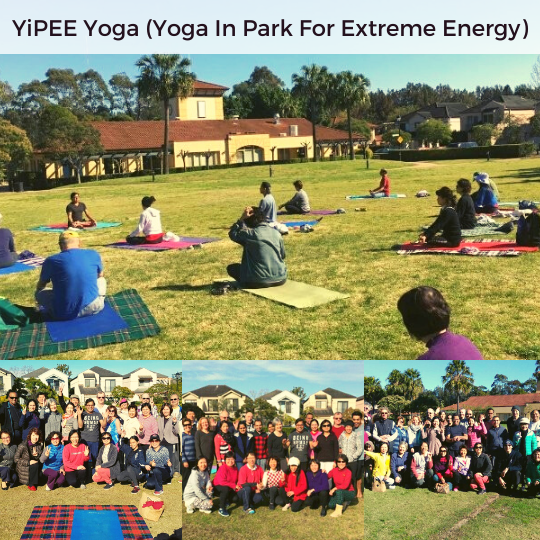
YiPEE Yoga
Staying true to my core beliefs, I have not lost touch with my roots. I am still an avid yoga practitioner, and in 2012, I had founded YiPEE (Yoga in Park for Extreme Energy) Yoga, which is a volunteer endeavour that aims to give back to society by raising awareness about the health benefits of yoga. Personally, yoga has played a pivotal role in my life as a coping and healing mechanism. As I had previously mentioned, I was born with clubfoot, and yoga had helped me overcome my physical limitations, so I knew that I had to spread awareness about its potential to help others who may be in a similar position. I had been holding free yoga sessions for over 60 people every Saturday morning at Liberty Grove (Sydney, AU), and everyone was welcome to be part of it. Now I intend to restart the same here in Cupertino, California once the COVID-19 crisis comes to a closure. In disciplining my body and mind, I keep every Saturday as a day for rigorous fasting, with neither intake of food nor water. I am continuously doing this since 2005. As a firm believer in spirituality and karma, I never miss an opportunity to learn more about these subjects from those who are more enlightened, and I strive to remain the ever-conscientious learner.
Reflecting back
If I were to narrate my illustrious career to my younger self, I would have scarce believed that I would transcend my humble beginnings and go on to trot the globe as a trainer and educator for so many professionals. This, more than anything else, stands as a testament to the potency of human willpower. I was, but an ordinary Indian kid with an extraordinary dream and I had managed to go from rural India to a global citizen. So, believe me when I tell you that everyone is capable of rising above their circumstances to an unfathomable extent, provided they possess the pragmatism, insight and perseverance to do so. If you take this to heart and believe in your capabilities, you can be rest assured that others will follow suit.
Note: In a mood of celebration I have decided to discount all my following online PgMP®/PfMP®/E-Learning programs purchased between June 20, 2020, to July 20, 2020, by a further 100$. Use the discount coupon code “DHARAM50” to avail this discount.
Online PgMP® Mentoring Programs – http://bit.ly/2oBKQXQ
Online PfMP® Mentoring Programs – http://bit.ly/39jOZSf
E-Learning Programs – http://bit.ly/3b2HOid
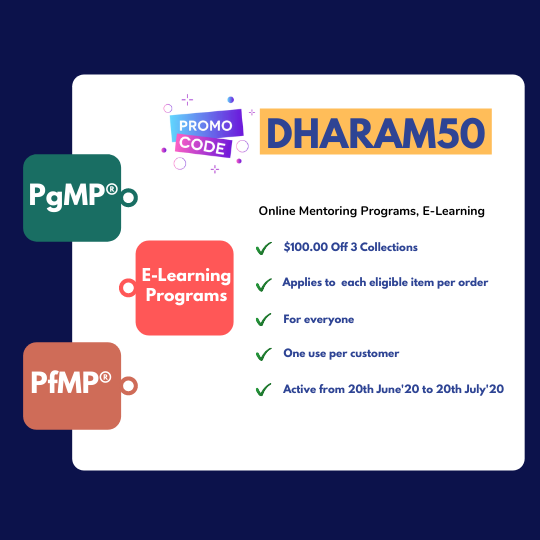
DHARAM50
For any related queries, book an obligation free 15 minutes with me by visiting talktodharam.com or drop an e-mail to [email protected].











































Recent Comments